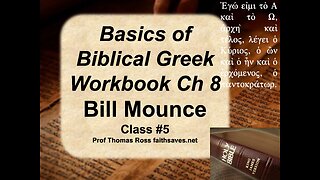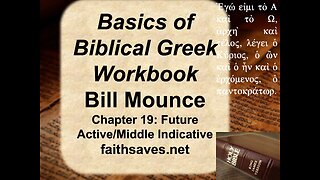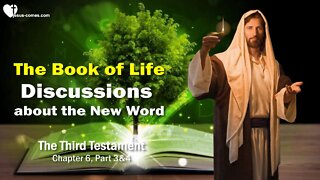New Testament Greek #23: Basics of Biblical Greek vocabulary chapter 20 & Workbook chapters 19-20
Lecture #23 in New Testament or Koine Greek, covers the vocabulary in chapter 20 of William (Bill) Mounce’s Basics of Biblical Greek textbook, along with chapter 19 in Basics of Biblical Greek Workbook by Bill Mounce.
In the chapter vocabulary, βαπτίζω means “immerse” or “dip.” The μα suffix is often used in Greek to specify the result of the action described by the root. The result of being immersed (βαπτίζω) is that one has received baptism (βάπτισμα). Even in Mark 7:4-5 baptidzo has its normal meaning; the “tables” or dining couches of the passage were indeed immersed by the Jews. Also, there is no conspiracy against immersion in the fact that the KJV translators transliterated the verb instead of rendering it "to immerse."
Also, in the chapter vocabulary the fact that the King James Version renders βαπτίζω as "baptize" rather than as "immerse" is not because of a conspiracy to hide the fact that baptism involves immersion; King James himself was immersed (albeit as an infant). Among Protestants in England a movement against immersion actually really only started with the Westminster Assembly of 1643-1649—several decades after the translation of the KJV—when immersion was rejected in favor of sprinkling or pouring by only one vote after heated debate.
Concerning the vocabulary word "tongue, language," γλῶσσα, -ης, ἡ, note that the word is always used of real languages, not of people speaking gibberish after the manner of modern Pentecostalism. Pentecostalism requires a rejection of sound hermeneutics, following its antecedents in the Keswick and Higher Life movements:
"[There is a] distinct hermeneutic, a distinctively Pentecostal manner of appropriating the Scriptures. In contrast to magisterial Protestantism [and Baptist orthodoxy] ... Pentecostalism reads the rest of the New Testament through Lukan eyes ... [placing] [n]arrative material [over] ... didactic ... Pauline texts. ... In making this claim, Pentecostalism stands in a long tradition of a “subjectivizing hermeneutic.” ... The “higher life” antecedents to Pentecostalism in the nineteenth century used a similar approach to Scripture in appropriating elements of the Old Testament Heilsgeschichte devotionally. The exodus from Egypt, the wilderness wanderings, and crossing Jordan River into the Promised Land all became stages in the normative pattern of the spiritual pilgrimage from conversion into the 'second blessing.'"
In relation to the vocabulary word μένω, note that the verb used for abiding/continuing/remaining in Christ. Scripture promises that all true Christians will abide in Christ:
But the anointing which ye have received of him abideth in you, and ye need not that any man teach you: but as the same anointing teacheth you of all things, and is truth, and is no lie, and even as it hath taught you, ye shall abide in him. (1 John 2:27)
Those who do not abide are cast into hell fire:
If a man abide not in me, he is cast forth as a branch, and is withered; and men gather them, and cast them into the fire, and they are burned. (John 15:6)
The one who does not, as a summary of his life, abide (aorist tense), or continue faithful to Christ, is cast into hell fire, where he will be continually burned (present tense) for all eternity. The branch without genuine connection to the Lord pictures an lost person with only a profession of Christianity. John 15:6 does not picture a loss of reward for a disobedient believer. Other than John 15:6, the verbs “cast forth” (ballo) and “burned” (kaio) are found together only in Revelation 8:8 and 19:20. Neither reference speaks of believers being cast forth or burned. Revelation 19:20 (cf. 20:11-15; 21:8, “the lake which burneth (kaio) with fire and brimstone”), however, demonstrates that the lost will be “cast (ballo) ... into a lake of fire burning (kaio) with brimstone.” Also, out of 125 instances of the verb “cast forth” (ballo) in the NT, believers are never once said to be cast forth by God, but the lost are, over and over again, said to be cast (ballo) into the fires of hell (note Matthew 3:10; 5:13, 25, 29-30; 7:19; 13:42, 48; 18:8-9; Mark 9:42 (cf. vv. 41-48), 45, 47; Luke 3:9; 12:58; 14:35; Revelation 2:22; 12:4, 9, 13; 14:19; 18:21; 19:20; 20:3, 10, 14-15). Thus, the verse indicates that a lack of fruit is evidence of a non-living, non-saving connection to the vine. Someone who does not abide, remain, or persevere in the faith was never truly born again.
The Basics of Biblical Greek workbook for chapter 19 translates from the New Testament and the Greek LXX:
α. John 11:48; β. John 9:21; γ. Luke 12:17; δ. John 8:12; ε. 1 Corinthians 16:4; ζ. —; η. Matthew 12:19; 1. Matthew 4:10; 2. Matthew 27:42; 3. Luke 1:13; 4. Philippians 4:19; 5. John 5:25; 6. Mark 13:13; 7. John 14:12; 8. John 4:22-23; 9. John 13:33; 10. Mark 12:29-31; 11. —; 12. —; 13. Deuteronomy 28:41; 14. (Exodus 23:24); 15. Genesis 12:1-2; 16. Matthew 5:48; 17. Romans 1:17; 18. John 14:15; 19. Mark 9:35; 20. Acts 13:22.
-
 2:10:23
2:10:23
KJBIBLE1611
1 year agoNew Testament Greek Lecture #5: Basics of Biblical Greek workbook, Chap. 8 & Conversational Koine
1.48K -
 1:38:49
1:38:49
KJBIBLE1611
2 months agoNew Testament / Koine Greek class #21: Basics of Biblical Greek Workbook, William (Bill) Mounce, 19
24 -
 10:23
10:23
The Third Testament
1 year agoDiscussions about the new Word of God ❤️ The Book of Life... 3rd Testament Chapter 6-2
97 -
 43:58
43:58
King of Kings International Messianic Ministries
1 year agoStudies in the Word of God... Romans Chapter 1
62 -
 9:45
9:45
DAILY BIBLE INSPIRATION
1 month ago $25.33 earnedMatthew - Chapter 13 DAILY BIBLE STUDY {Spoken Word - Text - Red Letter Edition}
7.08K5 -
 8:23
8:23
DAILY BIBLE INSPIRATION
1 month ago $49.31 earnedMatthew - Chapter 12 DAILY BIBLE STUDY {Spoken Word - Text - Red Letter Edition}
11.1K2 -
 5:23
5:23
DAILY BIBLE INSPIRATION
1 month ago $0.03 earnedMatthew - Chapter 11 DAILY BIBLE STUDY {Spoken Word - Text - Red Letter Edition}
1.21K2 -
 9:23
9:23
BibleQuiz
2 years ago $0.01 earnedRevelation Chapter 21 ~ Bible Study Quiz (Part One)
2211 -
 19:51
19:51
jdh730
1 year agoLesson 18: New Testament Christians 080819
16 -
 7:00
7:00
DAILY BIBLE INSPIRATION
1 month ago $23.33 earnedMatthew - Chapter 10 DAILY BIBLE STUDY {Spoken Word - Text - Red Letter Edition}
5.13K5